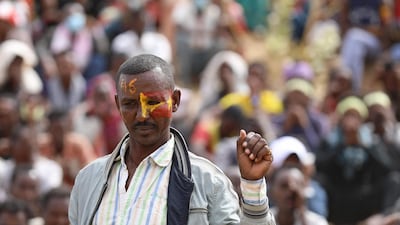Sudan and Ethiopia's border dispute intensified at the weekend, with Sudan saying it took a dim view of claims by Ethiopia that the Sudanese military was using the conflict for the benefit of a third party.
"Slander against Sudan and accusing it of being an agent for other parties is a grave and unforgivable insult," Sudan said on Saturday.
“What the Ethiopian Foreign Ministry cannot deny is the third party whose troops joined Ethiopian troops in trespassing on Sudanese territory,” said the Sudanese Foreign Ministry, not naming the third party.
Sudan, however, may have been referring to Eritrea, whose troops were reported to have gone into the northern Ethiopian region of Tigray to support federal forces battling separatist rebels there.
Both Ethiopia and Eritrea deny the presence of Eritrean troops in Tigray despite eyewitness reports and assertions by international agencies. Tigray borders eastern Sudan.
Sudan said it wanted Ethiopia to observe the terms of a 1902 demarcation agreement that was reaffirmed in 1972. Ethiopia said it would no longer recognise a colonial-era deal and wanted Sudanese forces to pull out from areas they recently taken back before it can negotiate a settlement of the dispute. Sudan has rejected that offer.
The border dispute flared late last year when Sudan’s military moved to wrest back control of farming enclaves inside the Sudanese border that have long been settled by members of Ethiopia’s ethnic Amhara group.
The Sudanese action resulted in a series of deadly clashes and led to claims by both sides of cross-border incursions.
The latest round of rhetoric began on Thursday, when Ethiopia's Foreign Ministry accused the Sudanese military of sacrificing the interests of the Sudanese people by fuelling the border dispute for the benefit of a third party.
It did not identify that party, which might also have been Egypt, Sudan's neighbour and ally to the north.
Egypt has been at odds with Ethiopia for years over a hydroelectric dam being built by Ethiopia that Egypt fears would reduce its share of the river's waters.
Sudan, like Egypt a downstream nation, also has a quarrel with Ethiopia over the project, formally known as the Grand Ethiopian Renaissance Dam.
Sudan contends that Ethiopia must share data on the operation of the dam to avoid possible flooding and the disruption of the operation of its own power-generating dams on the Blue Nile.
The border dispute, meanwhile, has been receiving international attention of late, with the African Union dispatching mediator Mohamed Hassan Lebatt, a Mauritanian, to Khartoum last week.
Saudi Arabia also sent a senior envoy to Khartoum and Addis Ababa last week.








